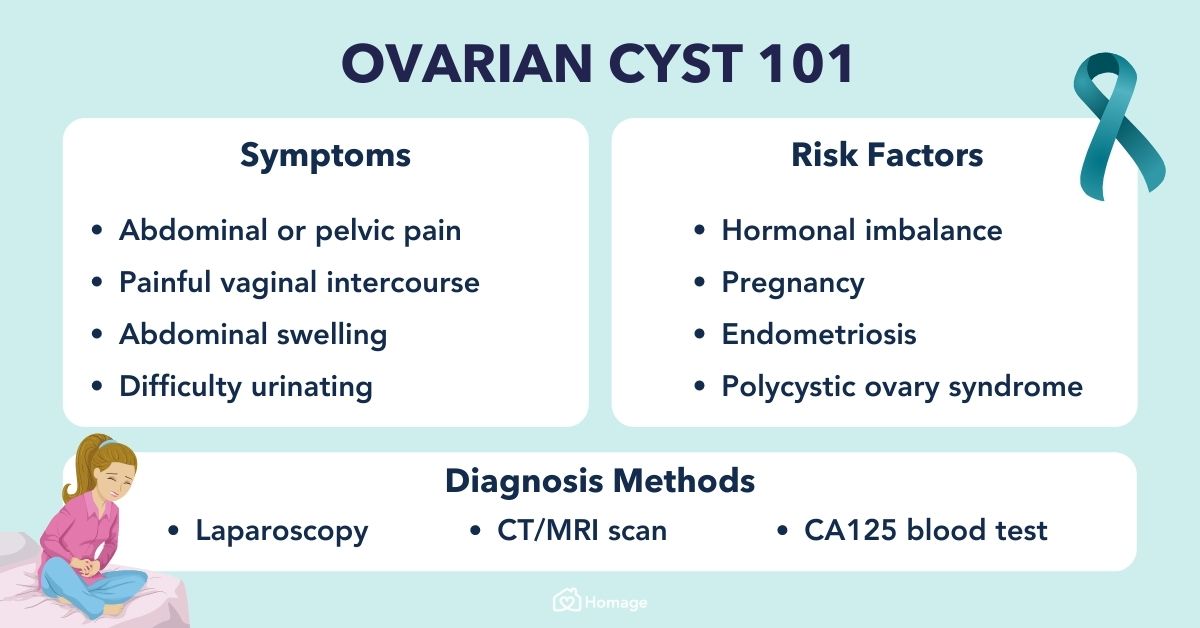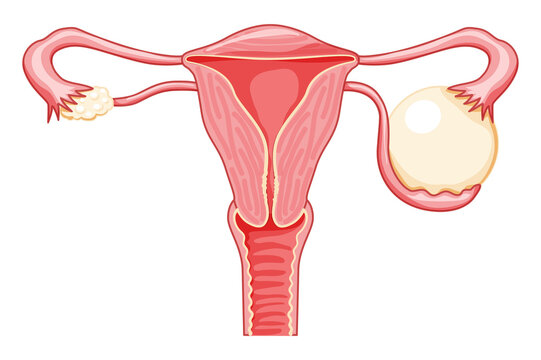Cysts can be caused by a variety of processes, including blocked glands, inflammation, trauma, genetic diseases, infections, and other conditions. Some cysts, such as functional ovarian cysts associated with normal reproductive cycles in women, may resolve on their own without any treatment. Meanwhile, other cysts, such as those caused by polycystic kidney disease, are chronic and can cause serious health problems.
Cysts are of different types, depending on their location, content, and the cause that prompts their appearance. These different types of cysts include:
The occurrence and health effects of each type of cyst can vary depending on many factors, including the size, location, and potential inflammation of the cyst.

Cysts are quite common and can appear anywhere on the body, including the skin, internal organs and tissues. The causes of cysts are diverse and are often related to inflammatory processes, obstruction, injuries, infections, genetic factors, neoplasia and other pathological conditions.
Inflammatory processes
A common cause of cysts is inflammation, which can lead to fluid accumulation and cyst formation. For example, pancreatitis (inflammation of the pancreas) can lead to the formation of pseudocysts, and a pilonidal cyst is often associated with inflammation in the hair follicle area.
Obstruction
Some cysts, such as odontogenic cysts or cutaneous cysts, may form due to obstruction of ductal or glandular fractures, causing fluid to drain and accumulate in the cystic structure.
Trauma
Physical trauma or damage can cause cysts to form as part of the healing process, which creates fluid-filled cavities. For example, a ganglion cyst is often associated with damage to a joint or tendon.
Infections
Bacterial or viral infections can cause inflammation and cyst formation. A Bartholin's cyst, for example, often results from an infection of the vaginal glands.
Genetic factors
Some cysts are associated with genetic disorders or inherited conditions. Polycystic kidney disease is an inherited condition in which many cysts form in the kidneys, eventually disrupting their function.
Neoplasia
Although most cysts are benign, some may be associated with neoplasia or develop from tumor tissue. Some cysts can be part of malignant tumors or develop near growing tumors.
Other pathological conditions
Cysts can also be associated with other health problems, such as autoimmune diseases, hormonal disorders, or metabolic disorders.
Although the mechanisms of cyst formation can vary depending on their type and location, many of them are related to excess tissue or fluid accumulation due to various reactions in the body. It is important to emphasize that although many cysts are benign and do not cause serious health problems, they may be associated with discomfort, pain or other symptoms that require medical intervention.
Often, cysts are asymptomatic and are found incidentally during medical examinations, but larger or inflamed cysts can cause noticeable symptoms that can affect the quality of life of individuals.
General symptoms
Common symptoms caused by cysts include local pain or discomfort, swelling, and dysfunction in the affected body part. Depending on the location of the cyst, specific symptoms may occur:
Specific symptoms by location
Diagnosis and treatment depend on the severity of symptoms and the effect of the cyst on the patient's quality of life. In milder cases, observation and symptomatic treatment such as pain relievers may be sufficient. A cyst with inflammation or infection may require antibiotics or surgical treatment, including drainage or removal of the cyst. It is important that individuals experiencing any symptoms caused by cysts see a healthcare professional who can perform a thorough evaluation and recommend an appropriate treatment plan.

Treatment of a cyst depends on many factors, including the type, size, location, symptoms, and potential complications of the cyst. While some cysts may resolve on their own without any intervention, others require medical or surgical intervention to prevent further health problems, relieve symptoms, or eliminate aesthetic concerns. Treatment strategies can range from simple observation to a complex surgical procedure.
Monitoring
Often, especially when the cyst is small and causing no symptoms, close monitoring may be recommended. This means regular check-ups and x-rays to monitor changes in the size and condition of the cyst.
Medical treatment
In some cases, medications may be prescribed to reduce symptoms or treat inflammation. For example, anti-inflammatory drugs may be used to reduce pain and swelling, and antibiotics may be prescribed for an infected cyst.
Drainage
Fluid-filled cysts may require drainage, which uses a needle or small incision to remove the cyst's contents. This can be done using local anesthesia and ultrasound or CT guidance to ensure accuracy.
Surgical removal
When the cyst is large, causes severe discomfort, is inflamed, or is suspected to be malignant, surgical removal may be recommended. Surgery can be performed using an open approach or less invasive techniques such as laparoscopy. The surgical procedure to remove the cyst not only removes the formation itself and its contents, but also reduces the risk of recurrence.
Hormonal treatment
Certain types of cysts, such as ovarian cysts, may be treated with hormone therapy to regulate hormone balance and reduce cyst formation.
Alternative therapies
Alternative or complementary treatment strategies such as dietary changes, herbal therapy or acupuncture may sometimes be used, especially to reduce symptoms or improve the patient's general well-being. However, these therapies should be used in consultation with a healthcare professional and not as a primary treatment method.
A cyst is a common phenomenon that can affect anyone and any part of the body. Although many cysts are benign and do not cause much concern, it is important to monitor their condition and contact your doctor if you notice any symptoms or changes. Early diagnosis and appropriate treatment can help prevent potential complications and ensure the best health care.

# cista